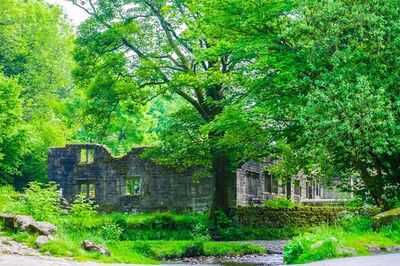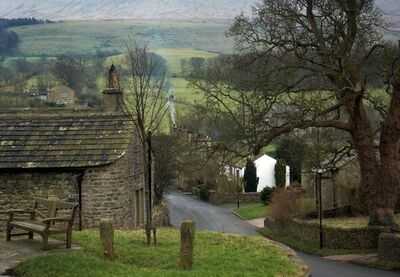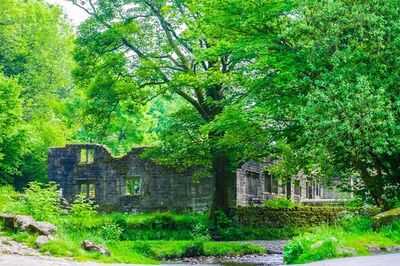
A tiny hamlet etched into British film and literary history was slowly abandoned by its residents.
The pretty hamlet of Wycoller, which lies four miles east of Colne in Lancashire, is unlike any other in the UK.
This sleepy village now forms part of a beautiful country park, which gives visitors the feeling of being transported back in time.
Aside from those belonging to the handful of remaining residents in Wycoller, all vehicles are banned, meaning traces of 21st-century life are limited.
Stand on the higgledy-piggledy Clam Bridge as it rises above the beck that runs through Wycoller, and you'll see exactly what people in the village have been seeing since it was built 1,000 years ago. That is, a small stream and a beautiful patch of countryside.

The first known human activity in Wycoller took place in the Stone Age, with the remains of flint tools and axe heads having been found scattered across the village. However, it wasn't until the 18th century that Wycoller was really put on the map.
Weaving arrived in the village in a big way and had brought riches to its residents, most of whom made their money on the handloom. At the same time as they were getting richer, the owners of the stately home in its centre were getting poorer.
"Originally owned by the Hartley family, the hall was extended in the late 18th century by its last owner, Squire Cunliffe. A keen gambler, Cunliffe also borrowed money against Wycoller Hall to fund the building work. He died heavily in debt in 1818. After his death, stones from the Hall were plundered to build nearby houses and other structures. The hall subsequently fell into ruin," explains English Heritage.
The hall is widely thought to have inspired Ferndean Manor in Charlotte Brontë's novel Jane Eyre. Charlotte and her family lived in nearby Haworth, and she would pass through the village on her way to stay with friends. Charlotte would've seen Wycoller in its pomp, which didn't last long.
The invention of power looms in the 19th century led to the village's decline. Weavers had to move to nearby towns to find work in the developing mills, and more than 35 houses were abandoned and fell into ruin as locals left. "By 1896, the majority of people had moved away from the village, and it was virtually deserted," English Heritage notes.
Like the once grand Wycoller Hall, most of its buildings started to crumble into the dirt.
In the 1940s, volunteers began the restoration of the village's remaining buildings, and Lancashire County Council bought the land from the Water Board in the 1970s, with the village and surrounding countryside becoming a designated Country Park.
Over time, many of the surviving old stone cottages were renovated and people began to move in once again. Now, many are occupied by people seeking a slice of countryside and tranquillity. There's even a B&B holiday cottage in the village - in a converted 300-year-old barn at Oaklands.
Fans of the film, 'The Railway Children' starring Jenny Agutter, may recognise the 15th-century Pack-Horse Bridge in Wycoller's centre. In a sequence from the film, Bobbie (Jenny Agutter) is seen sitting on the bridge, talking to Dr Forrest who is driving his pony and trap through the ford.
The Country Park's increasing popularity with visitors led to the decision to ban cars from the village, except for disabled badge holders and residents, with signs halting vehicles at the main road into the area.
There are two main car parks situated on the edge of the village at Trawden Road and Haworth Road. Visitors can pay and display their vehicles and then walk the mile or so into the village centre.
Like all good Lancashire villages, there are tales of spooky happenings that cling on to Wycoller. One of them is of Squire Cunliffe, a former resident of the Hall, who, having ridden hard across the moors, arrives home to find his wife in the arms of another.
"It is a wild, wind-blown, rain-lashed winter's night. A spectral horse gallops up to the moss-covered ruins of old Wycoller Hall, the rider a man dressed in early 17th century fashion He slides swiftly from the saddle, enters the house and dashes up long-vanished stairs. A door is flung open. Terrified shrieks pierce the pitch black; gradually, the screams subside into groans. Finally, silence closes in once more on the darkness," writes A Bit About Britain.
You may also like

'Anything can happen anytime': Rajnath Singh says India must stay ready for 'war-like situations'; calls for stronger indigenous defence

Union MoS Jitendra Singh announces special team visit to evaluate Kishtwar Airport under UDAN scheme

Thinking of studying in UK? Here's a word of advice from the High Commissioner for Indian students

Sausages are juicier and tastier with butcher's simple cooking hack

I asked four chefs the best way to cook chicken without making it dry







